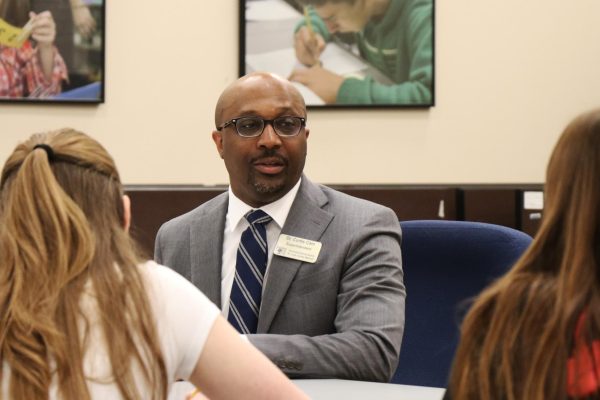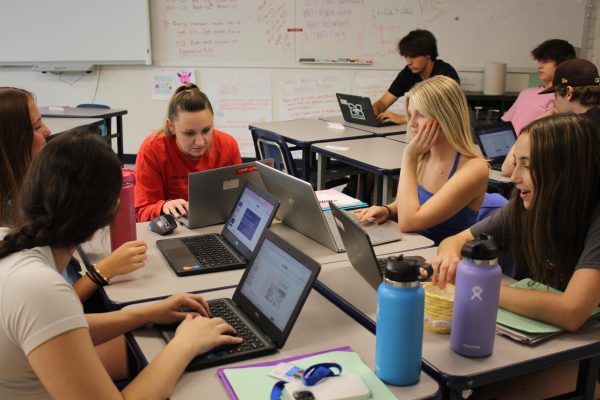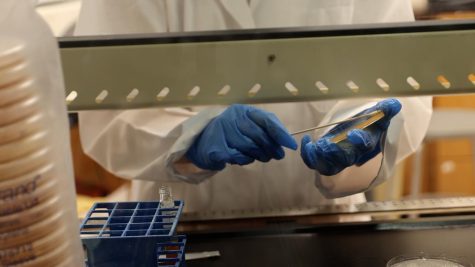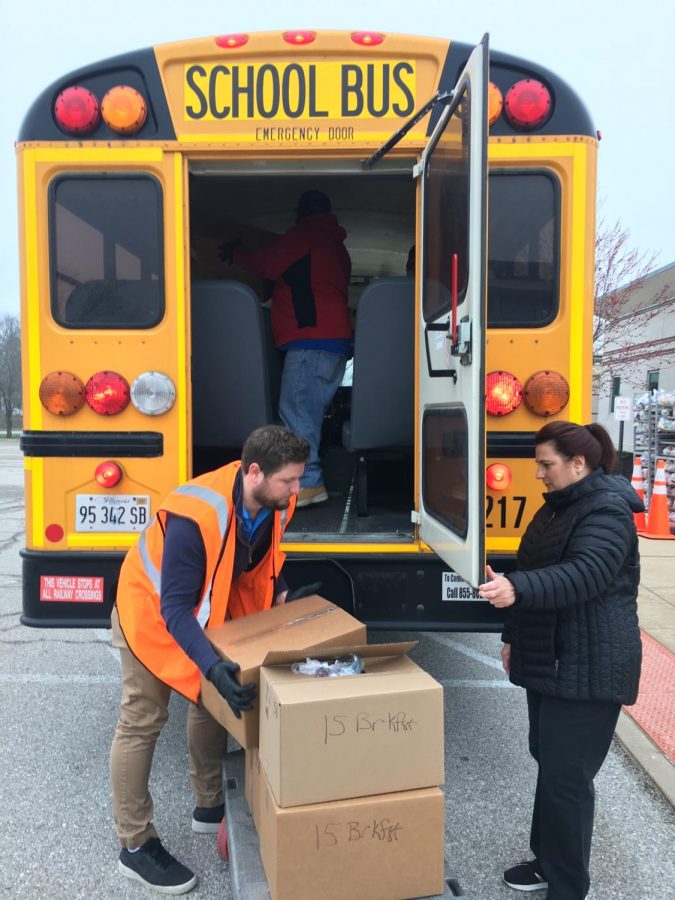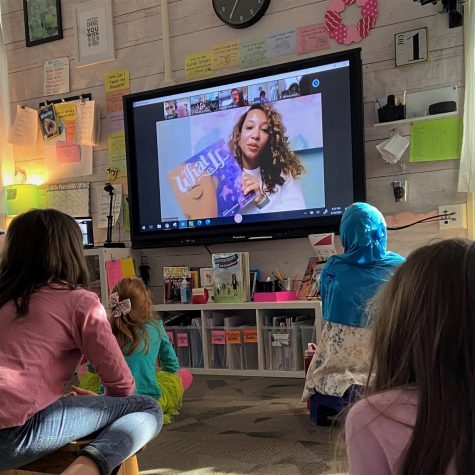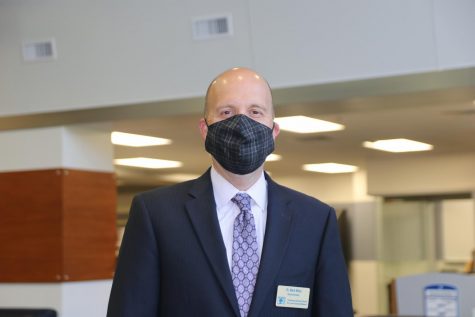RSD Community Lends Helping Hand to Students and Families
Media by Starr Giammanco
South Base Terminal Manager Alex Gensler (left) and Starr Giammanco, meal distributor, (right) load school buses with boxes of prepared meals for regional distribution.
Rene Moore, senior, faces a new stressor amid the threats of an unparalleled crisis in recent history with the novel coronavirus pandemic.
She is concerned for her grandparents’ medical issues and financial insecurity. Her grandmother is unemployed and her grandfather is out of work due to a shutdown at his job after reports of a positive case of COVID-19.
“I’m really worried about my grandparents’ health because they are at risk, and they refuse to stay in the house even though we send them things so that they don’t need to go outside,” Moore said.
As her grandparents avoided the news, they were unprepared for the repercussions of the outbreak. Moore’s family now uses Zoom for communication and Instacart, a grocery delivery and pick-up service, for deliveries to her grandparents.
Since March, the Moore family’s financial situation has mirrored others affected by the pandemic, which resulted in more than a million U.S. infections, shrunk the economy and produced an unprecedented unemployment surge, exposing financial vulnerabilities and creating a need for resources and benefits.
According to the Missouri Department of Labor, 54,710 Missourians filed for initial unemployment claims during the week ending April 25.
This supplements the overall 30.3 million U.S. citizens who filed for unemployment insurance over the past six weeks, according to the U.S. Bureau of Labor Statistics.
With increased economic turmoil, Moore said she is proud of RSD’s response of providing social-emotional health services, remote learning resources and food distribution sites.
“What the school is doing is fantastic because it’s so far beyond necessary,” Moore said. “The fact that they are doing this shows they legitimately care about us because the workers are willing to sacrifice their own health.”
Nationwide shutdowns of in-person instruction left schools struggling with student safety, reducing educational resource inequality and income inequality for students relying on free or low cost meals.
As of 2016-2017, more than half of Missouri public school students and more than half of all U.S. public school students were eligible for free or reduced-price lunches, according to the National Center for Educational Statistics.
Rockwood Child Nutrition Services staff serve about 1,500 meals a day for students at distribution sites at Selvidge, Rockwood South and LaSalle Springs middle schools, which has increased from 600 meals a day four weeks prior, according to the RSD website.
Starr Giammanco, meal distributor, works the Selvidge Middle “Grab and Go” curbside pickup site 8 to 10 a.m weekdays. Giammanco worked for the district for 25 years as a Child Nutrition Services employee and as kitchen manager at Babler Park Outdoor Education Center.
“I chose to contribute to the distribution because it is what I do,” Giammanco said. “The smiles and conversation with the kids and families is such an important connection. I hope the few minutes each morning with the families is a connection we will remember long after COVID-19.”
For the staff, work begins at 6 a.m. She said five workers are equipped with masks and gloves, and one hands out meals, prepared daily with breakfast and lunch, while others practice social distancing and handwashing in their assigned kitchen areas.
“We take every precaution we can when preparing and handing out meals, and I feel confident the risk of infection is low,” Giammanco said. “It is so awesome to see our people come together to help out our families and the kindness, compassion and support shown by all my co-workers.”
As the outbreak accelerates, Brittany Hogan, RSD Coordinator Education Equity and Diversity, supports students by finding different avenues to provide them meals and mobile internet hotspot access.
Focusing on food and resource equity, Hogan said there’s no financial burden on the district as the state government will be reimbursed for remaining school days, and she hopes to feed students at least through June.
“There are days where I feel more emotionally settled than I do others, and there are days where I really worry about our kids,” Hogan said. “I am doing the best that I can, and we continue to live in our motto ‘All In For Our Kids’ every day.”
She said RSD partners with St. Louis Public Schools and other local districts on food distribution, so students can receive meals in multiple St. Louis City and County locations without identification or worry of denial.
Hogan coordinates social workers’ food delivery stops to those lacking transportation, to homeless families, to families in transitional living and to first responders families. She said RSD and Voluntary Interdistrict Choice Corporation (VICC) use 10 total buses to transport and distribute food and technological resources.
She said she’s thankful for a wealth of support to the RSD Got Your Back Pack program, which supports homeless families and those underprivileged neighborhoods by providing food and resources in drop-offs twice a week.
“This has reminded me of the goodness of people, and that really bad things can happen but the love and goodness that exists in the world is still there,” Hogan said.
Hogan said the community assists others by giving donations, for instance, to the RSD The Giving Place. This program receives items such as feminine products, toiletries, clothes and beds for those in need of essential items.
“We are working to sustain our community, and if there’s something we can’t provide, we’re being resourceful to help them,” Hogan said. “The department is working on being loving, empathetic souls so our families know we are here to support them.”
Kristen Holness, junior, supports the community through The Salvation Army, a church and social service organization, and said their mission is to “serve human needs without discrimination.”
Their services in the St. Louis area includes food deliveries for seniors, food pantries, mobile markets, utility and mortgage assistance, drug rehabilitation, counseling and other emergency and social services.
“It’s very important to me that people in our communities get the resources they need to survive as they are sometimes the ones who fall through the cracks of society,” Holness said.
She said they distribute activity bags at drop-offs and open pantries to North County citizens containing educational items, craft materials and recreational items, to provide parents alternative ways to engage their children.
Karen Holness, Kristen’s mother, is a Salvation Army Officer, and said financial donations allow the organization to help others as COVID-19 continues to affect more individuals.
Karen said many are facing a greater challenge especially if they live with intergenerational poverty, educational deficiencies and overall health and wellness issues.
“This pandemic is a scary time with many unknowns,” Karen said. “Income inequality and other vulnerabilities are higher now and the need for assistance is monumental.”
Kristen said she hopes everyone realizes the severity of COVID-19 and takes recommended safety precautions to reduce the pandemic’s impact.
“Many people are becoming infected, and many are losing their lives, and I’m begging that we don’t just see the reports as numbers. I want them to see they are people with families,” Kristen said.
Your donation will support the student journalists of Marquette High School. Your contribution will allow us to purchase equipment and cover our annual website hosting costs. You may become a PATRON by making a donation at one of these levels: White/$30, Green/$50, Blue/$100. Patron names will be published in the print newsmagazine, on the website and once per quarter on our social media accounts.
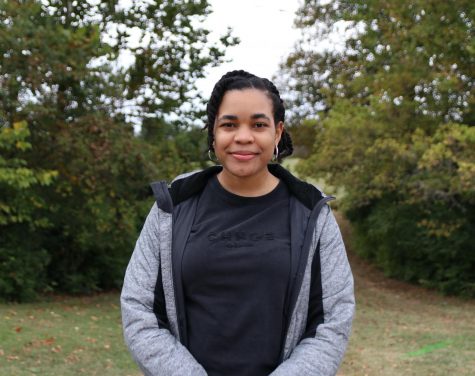
Lauren Pickett, senior, is the In-Depth Editor for the MHS Messenger. This is her second full year on staff. Also, Lauren participates in two other activities:...




